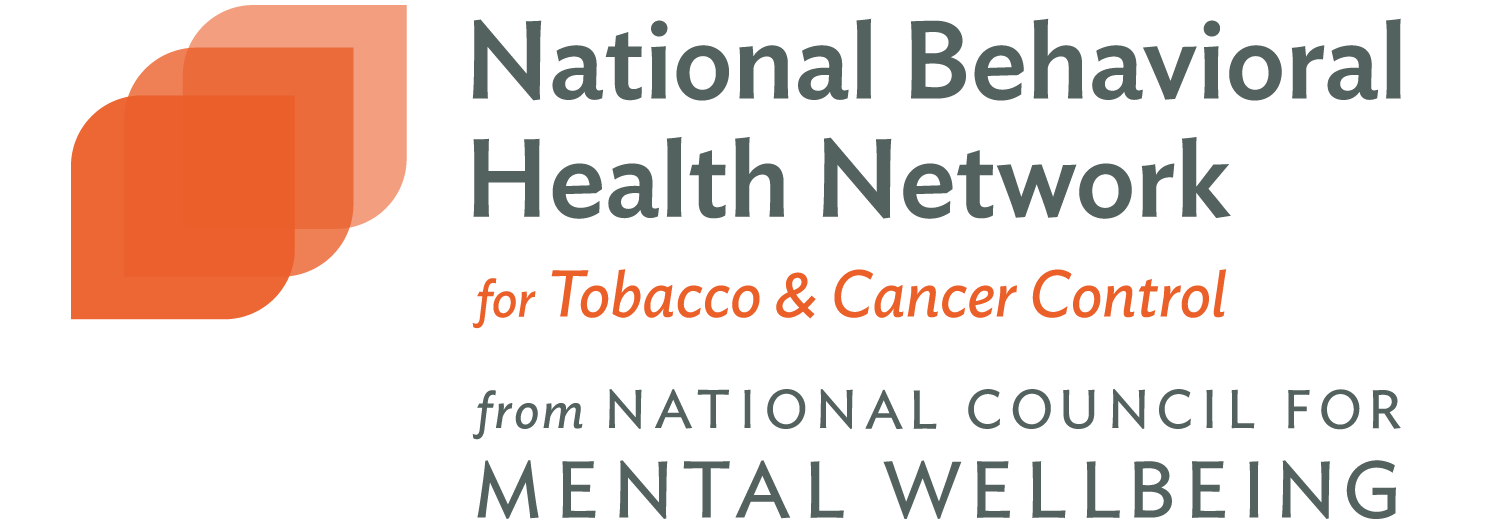As the COVID-19 pandemic continued through 2021, overwhelming public health agencies and other healthcare providers, twelve states, representing 8 of the 10 Department of Health and Human Services (DHHS) regions, committed to prioritizing their tobacco control efforts by participating in a six-month practice change intensive. The National Behavioral Health Network for Tobacco and Cancer Control (The Network) completed the eleventh Community of Practice (CoP) in 2021; bringing together diverse state teams with a shared goal of eliminating tobacco-related disparities among individuals with mental health and substance use challenges by enhancing their tobacco control efforts. This year’s CoP was the first time a cohort could not benefit from an in-person two-day kick-off meeting due to nationwide travel restrictions. However, the participating states maximized the benefits of virtual training and technical assistance, webinars, peer exchanges, and individual coaching.
A challenge for this year’s CoP cohort was balancing COVID-19 emergency response responsibilities while continuing to advance their state’s tobacco control, treatment, and cessation efforts. Team members from each state often had wore multiple hats at their public health agency but found ways to harmonize their roles by promoting tobacco cessation and lung health in the face of a novel lung-impacting virus. Owing to the social distancing policies in effect, states also overcame the challenge of working in remote conditions. Despite working in a virtual remote environment, states were still able to build new partnerships, propose new policies, and even host virtual convenings and summits to bring attention to tobacco-related disparities for individuals with mental health and substance use challenges.
At the end of the CoP, all twelve states highlighted their accomplishments during our virtual “Brag and Borrow” convening. At this virtual convening, states shared their successes and challenges with each other. Here are just a few highlights from the states:
- West Virginia Department of Health and Human Resources conducted a treatment and recovery assessment of their local facilities to identify the current landscape and evidence-based practices in place across their state in order to develop strategies around policy and practice change implementation for the future.
- The New Jersey Department of Health (NJDOH) engaged with Rutger’s School of Public Health to train and provide behavioral and mental health clinicians the opportunity to become Certified Tobacco Treatment Specialists (CTTS).
- The Georgia Tobacco Use Prevention Program (GTUPP) developed and disseminated a survey to assess behavioral health facilities’ status of implementing evidence-based strategies across 23 inpatient behavioral health and addiction treatment facilities in order to develop strategies around policy and practice change implementation for the future.
- North Carolina began the Breathe Easy NC campaign as a statewide effort to support people with behavioral health conditions in becoming tobacco-free by working with service providers to integrate tobacco use treatment and take campuses tobacco-free.
- Hawaii State Department of Health created a new infographic based on the SAMHSA Facility Locator data found through the CoP.
- Wyoming Department of Health conducted interviews with Community Prevention Specialists (CPS) to understand local behavioral health resources.
- Arizona Department of Health Services identified site champions, known as “Helpers for Behavioral Health,” with local behavioral health agencies to advance their state tobacco control plan.
- Wisconsin Department of Health Services implemented a “hub and spoke-” model to better engage their local mental health and addiction recovery facilities.
- Oregon Health Authority convened an expert panel to advise a broader assessment of tobacco recovery gaps in Oregon.
- Iowa Department of Public Health (IDPH) worked with the IDPH Behavioral Health Program to provide a webinar on integrating tobacco cessation into integrated care settings.
- Colorado Department of Public Health & Environment launched an updated version of their nicotine-free policy, including an electronic version where behavioral health facilities can review policy features based on their needs.
- Idaho Project Filter conducted a listening session with behavioral health providers to develop new marketing materials.
The stories of successes and challenges are truly inspiring to see, given the current times of so much uncertainty. Perseverance has been the overall theme for this cohort, and these twelve state tobacco control programs stayed the path to make a difference within their states. At the end of the CoP, states shared that they experienced:
- Increased capacity in data literacy, including how to access existing datasets and collecting state-specific data on mental health and substance use populations
- Increased confidence implementing tobacco control strategies that focus on individuals with mental health and substance use challenges
- Strengthened partnerships and new connections to enhance and sustain tobacco control strategies for individuals with mental health and substance use challenges
This group set the example for endurance and resiliency in this unusual year. They made use of minimal resources, increased peer and faculty engagement, and increased creativity in a completely virtual world. We are excited to see their continued work in closing the disparities gap to accessing tobacco cessation programs in behavioral health and mental health settings.
Are you interested in addressing tobacco and cancer control in your state? Need support in developing an action plan, engaging staff and/or receiving training and technical assistance? To learn more about The Network and gain direct access to free resources, training, e-digest, or to join our next CoP, visit BHtheChange.org or email us at bhthechange@thenationalcouncil.org

